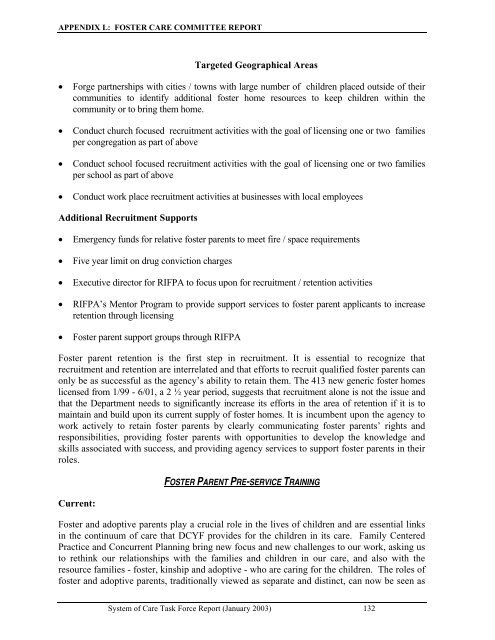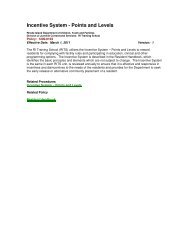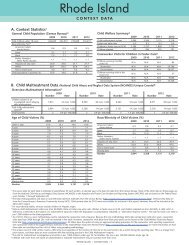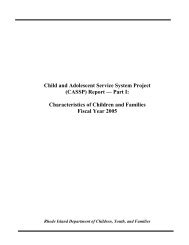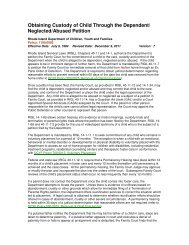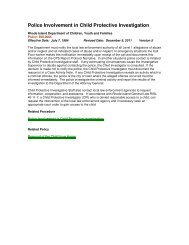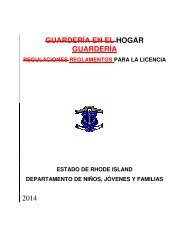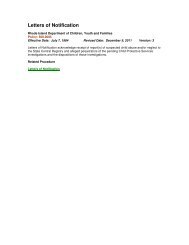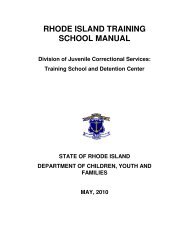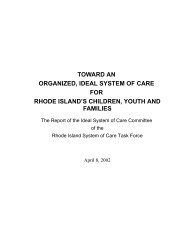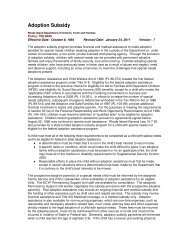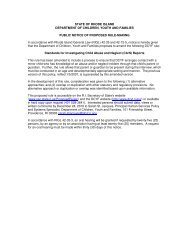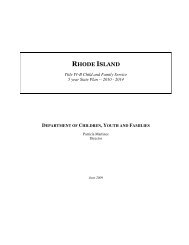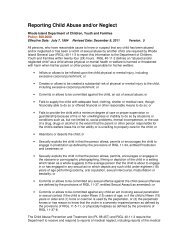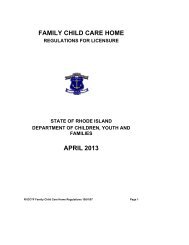Final Report - RI Department of Children, Youth & Families
Final Report - RI Department of Children, Youth & Families
Final Report - RI Department of Children, Youth & Families
You also want an ePaper? Increase the reach of your titles
YUMPU automatically turns print PDFs into web optimized ePapers that Google loves.
APPENDIX L: FOSTER CARE COMMITTEE REPORT<br />
Targeted Geographical Areas<br />
• Forge partnerships with cities / towns with large number <strong>of</strong> children placed outside <strong>of</strong> their<br />
communities to identify additional foster home resources to keep children within the<br />
community or to bring them home.<br />
• Conduct church focused recruitment activities with the goal <strong>of</strong> licensing one or two families<br />
per congregation as part <strong>of</strong> above<br />
• Conduct school focused recruitment activities with the goal <strong>of</strong> licensing one or two families<br />
per school as part <strong>of</strong> above<br />
• Conduct work place recruitment activities at businesses with local employees<br />
Additional Recruitment Supports<br />
• Emergency funds for relative foster parents to meet fire / space requirements<br />
• Five year limit on drug conviction charges<br />
• Executive director for <strong>RI</strong>FPA to focus upon for recruitment / retention activities<br />
• <strong>RI</strong>FPA’s Mentor Program to provide support services to foster parent applicants to increase<br />
retention through licensing<br />
• Foster parent support groups through <strong>RI</strong>FPA<br />
Foster parent retention is the first step in recruitment. It is essential to recognize that<br />
recruitment and retention are interrelated and that efforts to recruit qualified foster parents can<br />
only be as successful as the agency’s ability to retain them. The 413 new generic foster homes<br />
licensed from 1/99 - 6/01, a 2 ½ year period, suggests that recruitment alone is not the issue and<br />
that the <strong>Department</strong> needs to significantly increase its efforts in the area <strong>of</strong> retention if it is to<br />
maintain and build upon its current supply <strong>of</strong> foster homes. It is incumbent upon the agency to<br />
work actively to retain foster parents by clearly communicating foster parents’ rights and<br />
responsibilities, providing foster parents with opportunities to develop the knowledge and<br />
skills associated with success, and providing agency services to support foster parents in their<br />
roles.<br />
Current:<br />
FOSTER PARENT PRE-SERVICE TRAINING<br />
Foster and adoptive parents play a crucial role in the lives <strong>of</strong> children and are essential links<br />
in the continuum <strong>of</strong> care that DCYF provides for the children in its care. Family Centered<br />
Practice and Concurrent Planning bring new focus and new challenges to our work, asking us<br />
to rethink our relationships with the families and children in our care, and also with the<br />
resource families - foster, kinship and adoptive - who are caring for the children. The roles <strong>of</strong><br />
foster and adoptive parents, traditionally viewed as separate and distinct, can now be seen as<br />
System <strong>of</strong> Care Task Force <strong>Report</strong> (January 2003) 132


